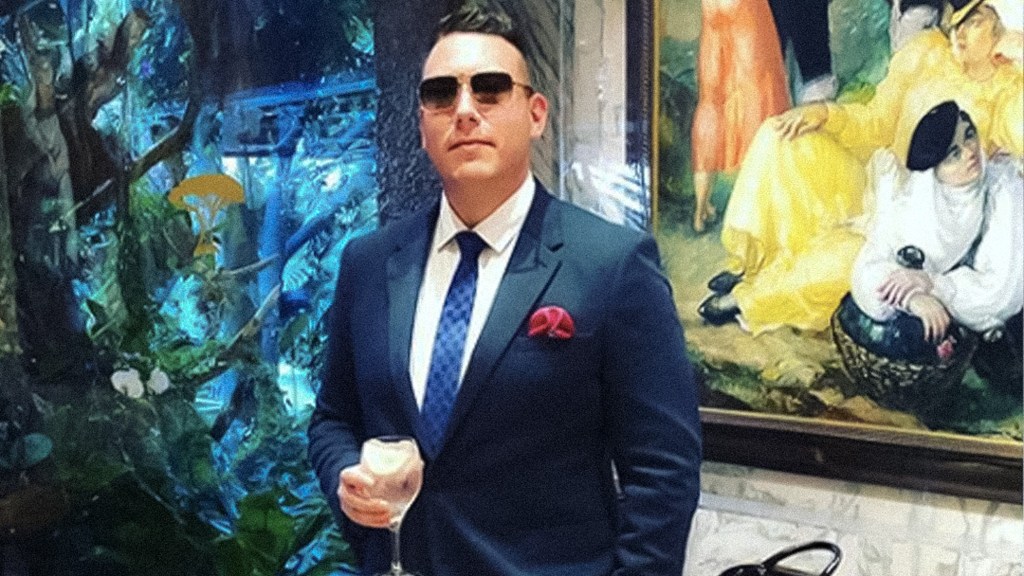“Entering the jail was hard and leaving it even harder.” These words come from Adil Farooq, a 26-year-old journalism student from Khrew, in south Kashmir, who was released from the Kot Bhalwal Jail in Jammu two weeks ago. And it’s strange to hear them, considering that last year, he was booked under the Public Safety Act (PSA) for allegedly working as an overground worker of militants. In January 2019, the local police arrested him. Two weeks ago, when the exercise to decongest jails in the face of the coronavirus pandemic in India hit Kashmir too, Farooq, along with 56 other Kashmiri prisoners, was released on bail. But 14 months later, life is no longer the same.
On April 14, as Farooq was joyfully embraced and kissed by his mother, Rafeeqa Banoo, at his Khrew home, he recalls feeling unmoved. “I cried when I entered the jail. Upon release, I cried even more because I could not bear the separation of losing my beloved jail inmates,” he tells VICE.
Videos by VICE
In Kashmir—where conflict and civil strife have ravaged the state for several decades, and reports of arbitrary arrests and human rights abuses often highlight the plight of locals in the state—the controversial PSA has been seen as not only a path to brutalise people, especially the young, but also seen as a dangerous precedent to the same youth taking up arms and joining militancy. The controversial PSA, which came into force in 1978, was introduced to fight crimes like timber-smuggling. With time, its scope broadened and now, many experts look at it as a tool for the Indian government to detain people on suspicion of being a threat to national security. They could end up behind bars for up to two years, even without a trial for being a threat to public order. An Amnesty International report states that some 20,000 arrests have been made under the Act since 1978.
A glaring example of this is the case of 23-year-old Zubair Ahmed Turay of Shopian, who had 19 FIRs (the first of which came when he was 11 years old) against him, and was arrested eight times under the PSA. Finally, on May 1, 2017, Zubair escaped from the illegal police custody and went on to join the Hizbul Mujahideen, a pro-Pakistan militant outfit. In 2018, he was killed along with six other militants in a gun battle with the Indian military forces.
Farooq’s story is one of the many and is symptomatic of the rising trend of psychological crisis in this region. His arrest came after he was questioned about having militancy links at different police stations in Khrew, Awantipora and Pampore. His PSA document, signed on February 1, 2019, states that he has links with militants and separatists under whose influence he had developed a militant ideology. He was also blamed for “instigating the same ideology” amongst the people of the area. Local police claim Farooq knows the topography of the area, which ensures safe transportation of illegal arms and ammunition through unconventional routes and away from the security forces regarding.
Farooq denies this, and so does his father—Farooq Ahmad Bhat—who was also summoned by security agencies and asked to hand over his son to them. Before his arrest, Farooq escaped out of fear and took refuge with his maternal grandparents. “The university had declared the examination date sheet just when I was facing threats and summons from security forces,” he recalls. “Despite the examination, my father handed me over to the police for questioning. The questioning and investigations continued for some days and the police assured my father that they would release me after January 26. That did not happen. I was jailed and charged under the PSA.”
In February 2019, without informing his family, the Jammu and Kashmir police transferred Farooq from the Pampore police station, where he was being questioned, to Kot Bhalwal Jail in Jammu, where most of the PSA detainees from Kashmir are kept. “I remember it was the first week of February. It was snowing when police put me inside a vehicle and handcuffed me,” he says. “Due to the snow, the vehicle was skidding on Jammu-Srinagar national highway. I begged the driver and guards to allow me to call my parents, but they refused. Near Ramban, we had lunch at a dhaba (roadside eating joint), but because of the heavy handcuffs, I could not eat properly.”
Farooq’s father would often visit him in jail. Through the steel mesh, he would give him hope that the local court has heard his matter and that the order for his release will come soon. “Every time my father said these words, I would tear up,” he says. In the meantime, Farooq’s imprisonment made it to local news. One month after his detention, Mirwaiz Umar Farooq, the chairman of Hurriyat Conference (M), a separatist group in the state, publicly denounced Farooq’s arrest under the PSA. “Our educated youth, if not killed, are detained with draconian laws like PSA and shifted to far off prisons, thousands of miles away from their homes and families, to punish them,” he said.
In the prison, Farooq found himself initially struggling to cope with being cut off from his family and his normal life. “It was a strange world. I felt I was lost in the depths of hell,” he tells VICE. “I could not sleep for nights together. But other Kashmiri prisoners hugged me and gave me confidence.”
But things changed soon. Sharing the barrack prison with 13 others, Farooq ended up looking forward to his days. It was a life of discipline and the boys focussed on etiquettes and manners. “Besides cooking and washing our clothes, we used to offer prayers, recite prayers from the holy book Quran, and join the classes to learn the teachings of Islam,” he says. “Almost every evening, we would sit and take interviews of each member. Sometimes, the barrack remained abuzz with poetry from inmates and sometimes, we would carry out comedy sessions, which brought us joy and laughter. Even our prison walls were like our friends. I could sense the walls were listening to us.”
Very briefly, the boys had some trouble with a jail superintendent, who, one day, took a pair of scissors and cut off the hair of all the inmates. “This was a gross human rights violation,” says Farooq. “I couldn’t stand it and complained. She was promptly transferred and things got better.” The new superintendent was nice, adds Farooq, and organised cricket tournaments. “I myself used to hold the presentation ceremonies. It was as if we were living our life on another planet.”
Today, sitting at home, the 26-year-old looks back with much fondness. “My parents are happy, but I have gone quiet because the memories of jail haunt me and I really miss one of my jail inmates, Waseem Dar,” he says. Dar, 21, belongs to Chakoora Pulwama, known for being the hotbed of militancy and conflict. Dar was also charged under PSA and shifted to Kot Bhalwal Jail, where he met Farooq and became his close friend. In prison, the two would often end up doing things together. Today, Farooq has kept Dar’s photo as his own WhatsApp profile picture.
On April 14, when Farooq received his release order from the jail clerk, he felt immense frustration and anxiety. He knew he had to say goodbye to his friends. “When I came across my releasing order, I rushed to the barrack and informed my jail inmates,” he says. “They were upset and for the next three days, I could not stop my tears. My blood pressure also increased as I was more worried about my younger friend Waseem. Who would take care of him once I’m gone?”
The next day, Farooq was asked by jail authorities to inform his parents to come and receive him. “I called my father and told him to come next week because I was unwilling to leave jail. I was more worried about my beloved jail inmates. Three days later, my father himself came to the jail to get me out,” he says. Before leaving, Dar gifted him a letter and a pen. “He asked me to not open the letter until he also gets released from the jail,” Farooq tells me. “I have kept the promise. I have not opened the letter yet. God willing, I will read the letter with him when he will be out of jail.”
Farooq’s friends outside the prison have noticed the silence. They prod him for answers, but Farooq doesn’t want to reveal the reason: The jail has become his new home. His jail inmates are now his new family. “My friend Waseem once told me that if I leave him, he will turn orphan,” he says. “We used to help and console each other back in prison. It was a different life. Sometimes, we would even forget we have homes and parents.”
These days, Farooq follows the schedule of his prison time. He wakes up early and offers prayers. “My friend Waseem and other prisoners are always in my prayers. May Lord release them soon,” he says with a deep sigh. As the world reels under the “new normal” because of the pandemic, for Farooq, that feeling in his conflict-riddled home state is a distant memory, with his new family and home.
Follow Irfan Amin Malik on Twitter.
More
From VICE
-

Sean Combs arriving at the Costume Institute Benefit at The Metropolitan Museum of Art in 2017. Photo by Marechal Aurore/ABACA/Shutterstock. -

Photo by Kyle Rivas/UPI/Shutterstock -

-

